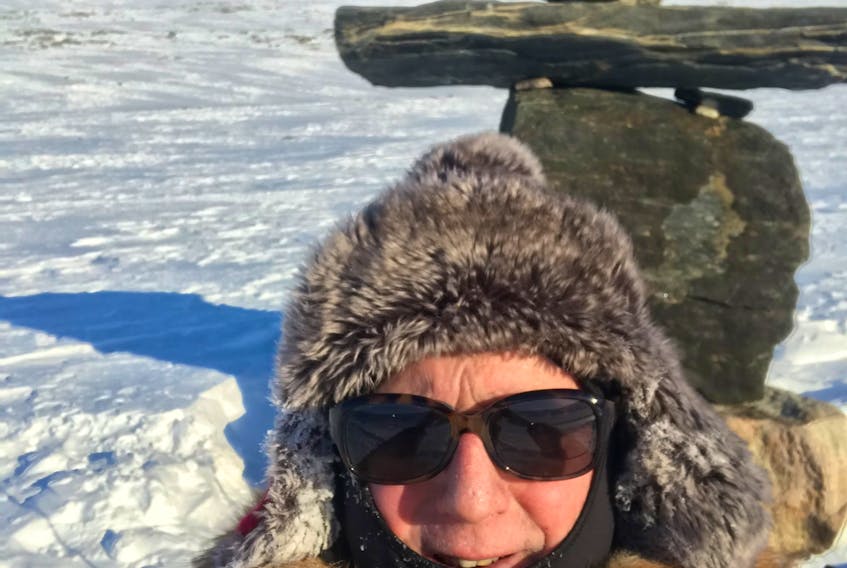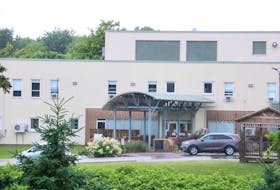The late Dr. David Murphy, as my column last week noted, was a multi-faceted guy.
Many people walking the earth are happy that he decided that being a veterinarian wasn’t for him. Instead, Murphy, who grew up in Montreal, switched to looking after humans, eventually becoming a cardiac surgeon who saved the lives of children and adults.
Yet, as I tried to make clear in my scribblings, he was more than just one thing. He fly-fished, skied and played the banjo and fiddle.
When Murphy hung up his operating room gown, he trooped right down to NSCAD and enrolled full-time in the Bachelor of Fine Arts program, where he discovered his affinity for sculpture.
Not just any sculpture mind you. Since he owned an old farm in Lunenburg County, he would salvage old equipment from his barn and turn it into metal sculptures with the help of the blacksmith’s forge and welding machines he learned to handle.
You see, traditional retirement age is right around the corner, and I am hearing unsettling rumblings that it's not all that it is cracked up to be.
When he wasn’t doing any of that, Doctor Dave, as his 40-years-younger classmates nick-named him, was often out in the field looking after his flocks of sheep — an activity he approached with the same joyful seriousness as doctoring or sculpting.
I bring all of this up again because somewhere in my research, I learned that Murphy took his lead from his old professor at McGill, Wilder Penfield, the great neurosurgeon, who once wrote an essay called The Second Career, which makes the case for thinking about retirement not as the runway to the old-folks home, but as an opportunity to cultivate excellence in a new field, which, in Penfeld’s case, was writing historical novels and medical biography.
You see, traditional retirement age is right around the corner, and I am hearing unsettling rumblings that it's not all that it is cracked up to be.
Anecdotal stuff, but also articles like one that appeared in The Atlantic a year ago penned by the Harvard Professor and social scientist Arthur C. Brooks: “Of course, some people enjoy retirement,” he wrote, “but since I have been writing about happiness later in life, many people who were successful earlier in life have reached out to me to say that retirement has been brutal: They feel unhappy, aimless, and bored. In search of — well, they’re not quite sure what — some have made bad choices, tanking their marriages … or making stupid business decisions they don’t think they would have made when they were still employed.”
One person told Brooks, “Since I quit working, I feel like a stranger to myself.”
It was, therefore, refreshing to be on the phone yesterday with Len MacDonald, who is 69 and used to call Antigonish home, but spoke to me from Kangiqsuluaq, a largely Inuit fly-in community of 900 in Northern Quebec where he has lived since 2019.
That year was a bad one for MacDonald, who had retired from the financial services sector in 2015: he and his wife separated after 37 years of marriage; his younger brother died. He needed something, though like the folks who reached out to Brooks, he wasn’t sure exactly what.
MacDonald’s comfort zone, though, was broad: a musician as well as the author of six books, he was a traveller who had seen some of the world, including doing volunteer work in India.
Physical hardship didn’t scare him: MacDonald has finished a pair of Boston Marathons, and two summers ago walked the Cabot Trail to raise money for a friend who had suffered a stroke.
He thought briefly about volunteering in Africa. What changed MacDonald’s thinking was a series of conversations he had with Maggie MacDonnell, the 2017 winner of the $1-million Global Teacher Prize, probably the world’s most-coveted and high-profile award for teaching excellence, for her work teaching in the Inuit community of Salluit, in northern Quebec.
Even before she moved back to Antigonish, MacDonnell had made some Facebook posts about the high turnover rate for teachers in the North and the need for professionals in the classroom there.
MacDonald, who had seen those posts, started his working days a teacher, spending 1976-79 at a small rural elementary school in Alberta. Returning to Nova Scotia, he could not find a teaching job and went into financial services instead.

“I didn’t necessarily want to teach again,” he told me, “but the North had always fascinated me.”
When he arrived in Kangiqsuluag — which, on a map of Quebec, is just a touch South of Salluit — in November 2019, it was pitch black and cold as only the Canadian North can be.
MacDonald, who hadn’t taught in 40 years, had a classroom full of Grade 6 students, none of whom had more than a year or two of English under their belts.
The thing not to do is “to spend the third period sitting there on the bench.” Instead, take a chance. Do something that helps the world.
“I was supposed to teach them something culturally relevant,” said MacDonald. “It was the hardest thing I’ve ever done in my life.”
That, though, was 18 months ago. Once he got over the shock of things — the COVID shutdown didn’t help — MacDonald started to get a feel for the community. The geography is stunning. His guitar playing and singing has made him a part of the community, where he sings in a musical group for eco-tourists to the area, and the school where he occasionally pulls up a chair in the hallways and plays John Denver and Johnny Cash tunes.
“I’m in love with the place,” said MacDonald, an outdoorsman, who recently hiked seven kilometres in –50 Celsius with school colleagues and who calls the decision to head North “easily the greatest experience of my life.”
You could hear that over the phone Tuesday. You don’t have to do something extreme like move to the High Arctic to give the “third period of life” meaning, he said. At the same time, just doing easy things isn’t good either.
“Do something that will make your brain work,” he said, “something that will push you instead of letting you just sit back and obsess about Trump or COVID.”
The thing not to do, he said, is “to spend the third period sitting there on the bench.”
Instead, take a chance. Do something that helps the world. As Penfield put it, “It may be that the last work of the old man’s hands will serve society best — and him as well."









